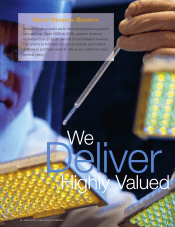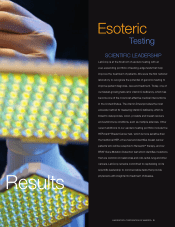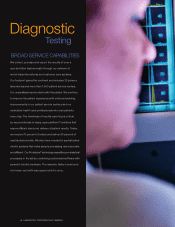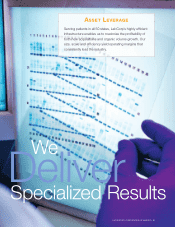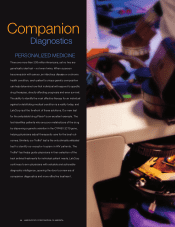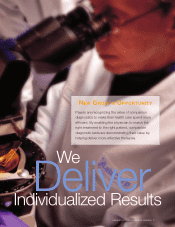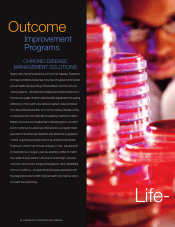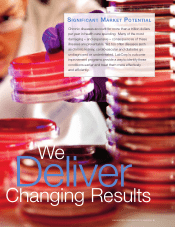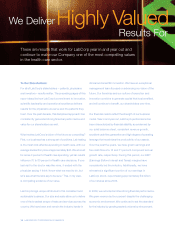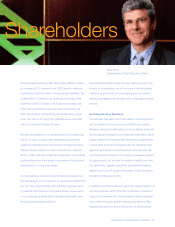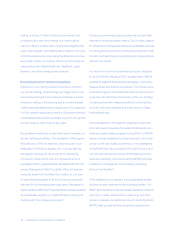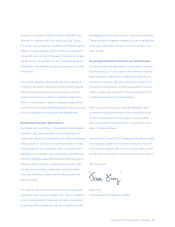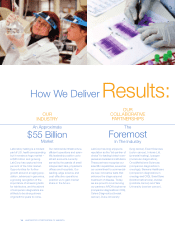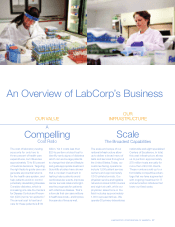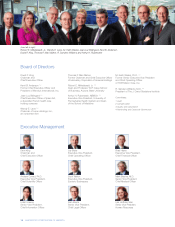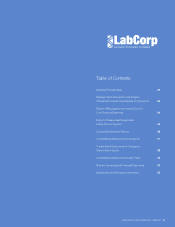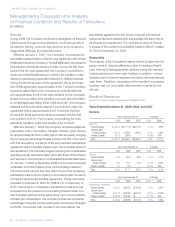LabCorp 2009 Annual Report Download - page 14
Download and view the complete annual report
Please find page 14 of the 2009 LabCorp annual report below. You can navigate through the pages in the report by either clicking on the pages listed below, or by using the keyword search tool below to find specific information within the annual report.12 LABORATORY CORPORATION OF AMERICA
testing, and about a third of that volume comes from
physicians who send their testing to a local hospital.
LabCorp offers a broader menu of services at signifi cantly
lower cost to payers, and initiatives are in place to win more
of that business by communicating the effi ciency and value
we provide. Finally, we continue to focus on enhancing our
relationships with UnitedHealthcare, WellPoint, Cigna,
Humana, and other managed care partners.
Expanding Esoteric Testing Capabilities
Expansion of our strong esoteric franchise is critical to
our growth strategy. A decade ago we began the journey
toward maximizing the full medical and market potential
of esoteric testing. In the ensuing years, we have steadily
made these specialized tests a larger part of our business.
In 2009, esoteric testing accounted for 36 percent of annual
consolidated revenue and we expect to grow to 40 percent
esoteric revenue within three to fi ve years.
Personalized medicine is an important way to broaden our
esoteric testing capabilities. The acquisition of Monogram
Biosciences in 2009, for example, advances LabCorp’s
leadership in infectious disease and oncology testing.
Monogram has been at the forefront of developing
companion diagnostics, with an impressive suite of
proprietary tests to guide treatment of patients with HIV and
cancer. Monogram’s Trofi le® is a state-of-the-art complex
molecular assay that identifi es the tropism, or cell type,
of each individual patient’s HIV and is the recommended
standard in this emerging diagnostic arena. Monogram’s
highly sensitive HERmark® test identifi es individual patients
who are falsely negative by traditional HER-2 testing and
could benefi t from receiving Herceptin®.
Outcome improvement programs also help doctors tailor
treatment to individual patient needs. Our Litholink program
for kidney stone management achieves remarkable success
in reducing stone recurrence and lowering treatment costs.
Litholink continues to grow in acceptance among physicians,
patients and payers.
Our follow-on outcome improvement program, targeted
at Chronic Kidney Disease (CKD), is beginning to fulfi ll its
potential to diagnose this extremely damaging – and costly –
disease earlier and slow its progression. The kidney stone
and CKD programs, and additional outcome improvement
programs that will follow, fi t squarely within our strategy
of helping physicians diagnose patients suffering from
an array of chronic illnesses and treat them in a highly
individualized way.
Commercialization of companion diagnostics is another
important area of expansion for esoteric testing and one in
which we made notable progress during 2009. Our KRAS
testing, used by physicians to guide therapy for colo-rectal
cancer, continues to gain acceptance in the marketplace.
UnitedHealthcare has contracted with LabCorp as one of
only two laboratories to conduct KRAS testing and now
requires a pathology report documenting KRAS gene type
to determine coverage for chemotherapy employing
Erbitux® and Vectibix®.
Other additions to our esoteric test suite similarly enable
clinicians to tailor treatment to the individual patient. Our
BRAF Gene Mutation Detection assay identifi es mutations
common in melanomas and colo-rectal, lung and other
cancers. Likewise, our Epidermal Growth Factor Receptor
(EGFR) tests provide important predictive guidance on


